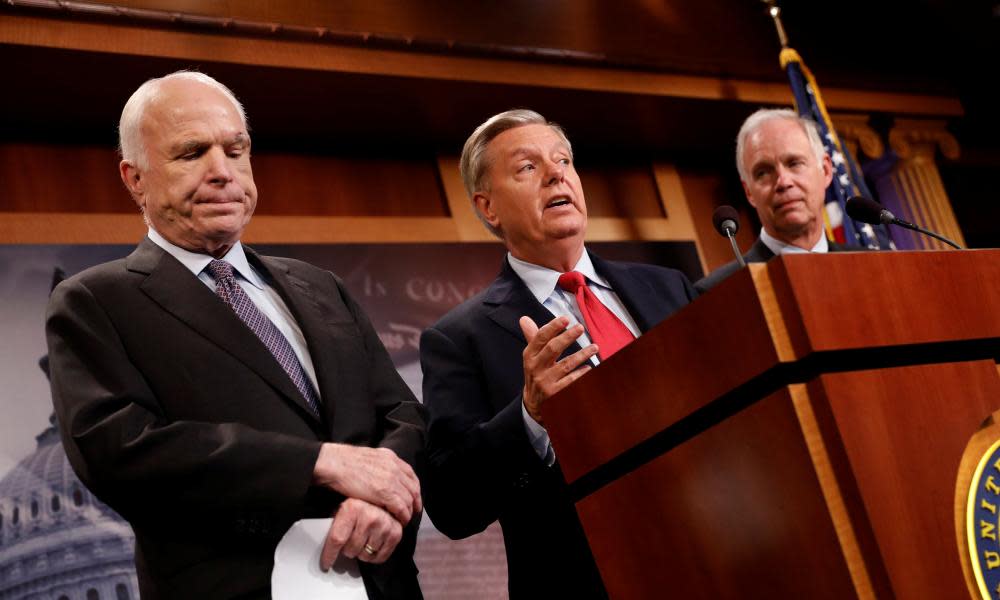US senate vote on 'skinny' repeal of Obamacare goes down to the wire

Senate Republican leaders unveiled their so-called “skinny repeal” bill – denounced by conservatives as a “fraud” and a “disaster” – in an eleventh-hour push to pass a pared-down repeal of the Affordable Care Act.
After three days of debate and seven years of promises to repeal Barack Obama’s healthcare law, Republicans introduced a far less ambitious measure that the leadership hoped would muster at least 50 votes.
The bill was made public minutes before 10pm EDT on Thursday night, giving senators only a few hours to review the measure before voting on it.
But three hours later drama continued on the Senate floor with no resolution and what appeared to be ongoing lobbying of holdout Republicans.
Republican senators had made clear that they did not expect – and did not want - the bill to become law. Instead, they were hoping it would trigger a conference committee, where they can enter into negotiations with the House on a much broader plan to repeal and replace the 2010 healthcare law.
But as the hours of debate wound down toward a vote, it remained unclear whether Republican leaders could win the support of 50 of the 52 members in their conference. Some Republicans expressed concern that the bill could become law if the two chambers were unable to agree on more comprehensive plan.
In a new analysis released roughly an hour after the bill was filed, the nonpartisan Congressional Budget Committee estimated that 15 million people would lose coverage and premiums would rise by 20% compared to current law.
Senate leadership had touted the “skinny” bill as a mechanism to force a conference committee with the House, taking time to hash out a compromise. As rumblings grew that the House might simply put the bill to a swift up and down vote, many Republicans began to hesitate about the legislation.
However, after a late night conference call with House speaker Paul Ryan, two of the most sceptical Republicans, Lindsey Graham of South Carolina and Ron Johnson of Wisconsin, announced they would vote for the bill, having received a guarantee that it would not become law.
AshLee Strong, a spokesperson for Ryan, “The speaker told senators exactly what his statement said: that we’ll go to conference if they pass something tonight. And then the onus is on the Senate to show it can pass a real plan with 51 votes.”
Shortly after that call, Senate majority leader Mitch McConnell finally unveiled the bill on the floor of the Senate, which he dubbed “the health care freedom act”.
Only hours earlier, Graham told reporters in a press conference with three other senators: “The skinny bill as policy is a disaster, as a replacement for Obamacare, it is a fraud.” Instead, Graham insisted simply that “it is a vehicle to get to conference”.
The South Carolina Republican, along with Johnson as well as John McCain of Arizona and Bill Cassidy of Louisiana, pledged that they would not vote for skinny repeal unless they received an ironclad guarantee from Ryan that there would be a conference committee.
When asked what that guarantee would consist of, Graham told reporters: “It’s like pornography – I’ll know it when I see it.”
In a statement shortly after the press conference, Ryan left room to manoeuvre on what next steps would be if the Senate passed the bill.
“Senators have made clear that this is an effort to keep the process alive, not to make law. If moving forward requires a conference committee, that is something the House is willing to do,” Ryan said in a statement. “The reality, however, is that repealing and replacing Obamacare still ultimately requires the Senate to produce 51 votes for an actual plan . . . Until the Senate can do that, we will never be able to develop a conference report that becomes law.
Cassidy accepted that statement while Graham and Johnson needed the conference call. However, McCain described it to reporters as “not sufficient” and would not respond to further questions on the topic.
For a bill to become law, the House and Senate have to pass identical legislation. The Senate bill being debated is an amendment of the underlying House bill. The House then can pass the underlying Senate bill or the two chambers can set up a conference committee where designees from both bodies meet to produce a compromise called a “conference report.” A conference report is very difficult to amend and then is subject to an up or down vote in both chambers.
In the past two days, the Senate has rejected both the ACA repeal plan introduced by Senate leadership as well as an almost total repeal of the Affordable Care Act, which it had passed in 2015 before a veto from Barack Obama.
The White House did not immediately respond to a request for comment about whether Trump would sign a “skinny repeal” bill if presented to him.

 Yahoo News
Yahoo News 
